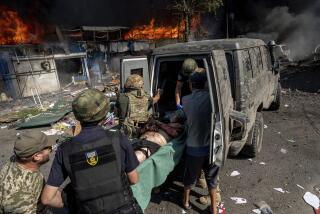It Couldn’t Happen Here, Could It?
- Share via
We Americans tend to look at internal ethnic conflict in other countries as a problem for “them”--the targeted ethnic groups. All that suffering in Rwanda or Bosnia is truly terrible, no doubt, and we do feel sorry for “them,” and we’ll help as much as we can. But them’s not us.
But sometimes the “them” issue does hit close to home. “Them”--the immigrant, the foreigner, the ethnic or religious minority--suddenly looms as a larger than life, irrational target of anger and resentment, especially when the issue is whipped up by people for advancement or self-aggrandizement. You can easily think of the names of politicians and religious leaders and other public figures over the years who have gone in for this sort of thing; you don’t need me to do it for you.
So what do Bosnia or Rwanda have in common with America? On the surface, not much. But let’s go beneath the surface. Let’s visit with Michael E. Brown of Harvard’s Center for Science and International Affairs. MIT Press has just published the massive study of internal wars around the world that he, 14 colleagues and a gaggle of researchers took three years to produce. Their masterpiece offers the invaluable if unintentional service of warning more peaceful places like America where they could go wrong.
More often than not, says Brown, ethnic cleansing is the product not of the irrational forces of history but of the premeditated decisions of totally rational, immoral leaders dead set on political gain at any cost. Says Brown: “Most major internal conflicts are triggered by internal, elite-level activities--to put it simply, by bad leaders.”
Brown was in Los Angeles the other day to brief colleagues at UCLA about his 653-page blockbuster, “The International Dimensions of Internal Conflict.” As he put it: “Elite decisions and actions are usually the catalysts that turn volatile situations into violent confrontations.” He insists that the reason many people in many parts of the world go around looking for other ethnic groups to hack to death has little to do with “ancient hatreds” or “historic roots”--the usual glib explanations for a horror show like Bosnia or Rwanda. To be sure, the kindling needs to be present and accounted for before the fires can burn out of control. But all too often, it is elites trying to grab or hold onto power who strike the match and send the society up in flames.
The conclusion is chillingly obvious. If there were fewer evil operators in positions of power, stirring up and creating “ethnic tensions” that in truth are barely smoldering, it would follow that there would be fewer Bosnias and Rwandas and Kashmirs and Sri Lankas. Of all the major internal conflicts in the world today, says Brown, the most basic form is ethnic. “And, he says, “they have the most extraordinary, severe consequences, including the most horrifying of all: ethnic cleansing.” Of the 34 major internal ethnic conflicts since the end of the Cold War, 23 have been consciously and deliberately triggered and engineered by political leaders inside the countries involved, says Brown.
This is Machiavellianism gone insane. One undeniable implication of this disturbing study is that the exploitation of ethnic tension--at whatever level of intensity, however low down in the fool chain--is inherently worrisome. Of course in the United States, ethnic tensions have not led to anything so heinous--not by a long shot. But decent people everywhere, including Americans, need to be exceedingly leery of anyone who would ride or exploit the wave of ethnic tension. Even though the likelihood of ethnic cleansing in the United States surely is low, we need to sharpen our ability to identify elites or leaders who would target certain groups in order to climb to power or hold onto it.
So whenever we see or hear a leader blaming “them” for our problems, let the red flags go up. I would argue also that whenever someone says so-and-so is the right person for some public job or role in society simply because of his or her ethnicity--or conversely whenever it is asserted that someone is the wrong person for a job simply because of his or her ethnicity-- we need to think very hard about that assertion and about that person. Whenever we observe a political leader playing the ethnic tension card, whether Democrat or Republican, labor or business or political leader, we should reflect on Brown’s findings. To me, his study suggests: Follow the logic and see if it doesn’t get you uncomfortably close to where you don’t want to be. Note, too, that the potential ethnic cleanser might at first glance pass inspection as just another politician.
Of course, nothing so terrible could ever happen here. Absolutely nothing to worry about. Of course.
More to Read
Sign up for Essential California
The most important California stories and recommendations in your inbox every morning.
You may occasionally receive promotional content from the Los Angeles Times.












